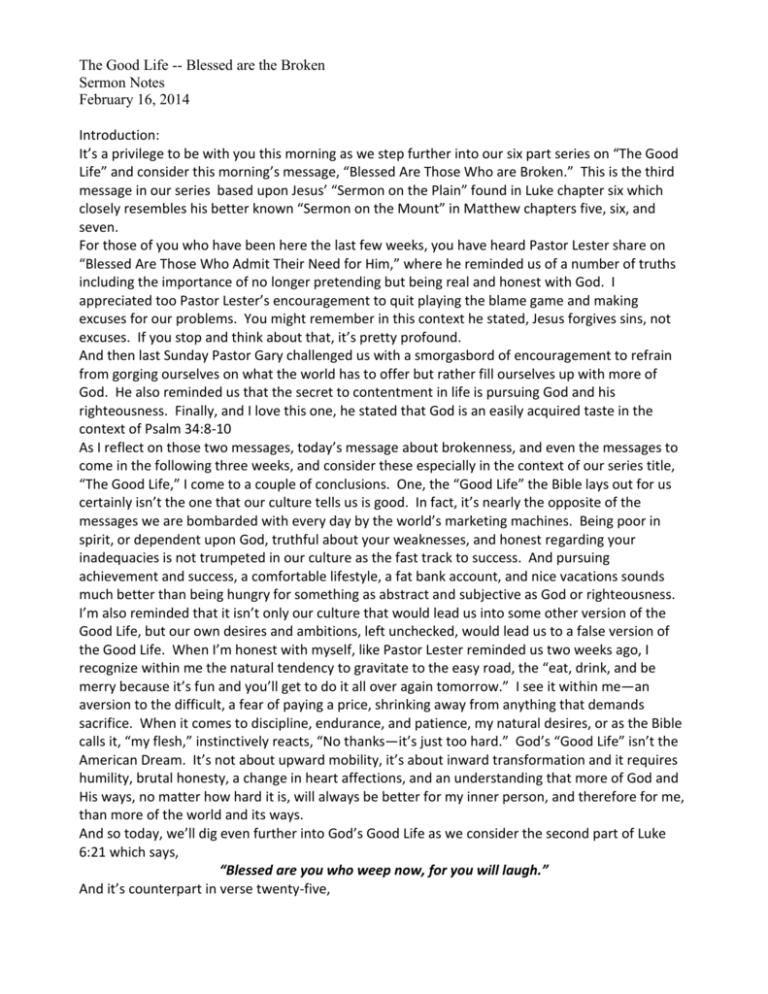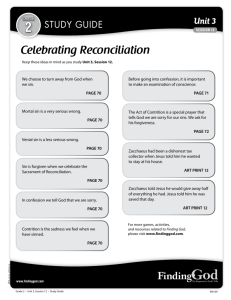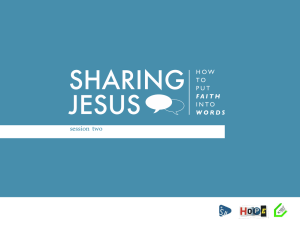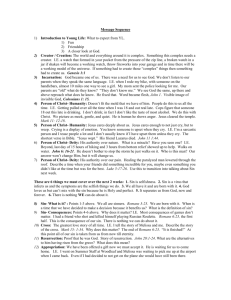The Good Life -- Blessed are the Broken Sermon Notes February 16
advertisement

The Good Life -- Blessed are the Broken Sermon Notes February 16, 2014 Introduction: It’s a privilege to be with you this morning as we step further into our six part series on “The Good Life” and consider this morning’s message, “Blessed Are Those Who are Broken.” This is the third message in our series based upon Jesus’ “Sermon on the Plain” found in Luke chapter six which closely resembles his better known “Sermon on the Mount” in Matthew chapters five, six, and seven. For those of you who have been here the last few weeks, you have heard Pastor Lester share on “Blessed Are Those Who Admit Their Need for Him,” where he reminded us of a number of truths including the importance of no longer pretending but being real and honest with God. I appreciated too Pastor Lester’s encouragement to quit playing the blame game and making excuses for our problems. You might remember in this context he stated, Jesus forgives sins, not excuses. If you stop and think about that, it’s pretty profound. And then last Sunday Pastor Gary challenged us with a smorgasbord of encouragement to refrain from gorging ourselves on what the world has to offer but rather fill ourselves up with more of God. He also reminded us that the secret to contentment in life is pursuing God and his righteousness. Finally, and I love this one, he stated that God is an easily acquired taste in the context of Psalm 34:8-10 As I reflect on those two messages, today’s message about brokenness, and even the messages to come in the following three weeks, and consider these especially in the context of our series title, “The Good Life,” I come to a couple of conclusions. One, the “Good Life” the Bible lays out for us certainly isn’t the one that our culture tells us is good. In fact, it’s nearly the opposite of the messages we are bombarded with every day by the world’s marketing machines. Being poor in spirit, or dependent upon God, truthful about your weaknesses, and honest regarding your inadequacies is not trumpeted in our culture as the fast track to success. And pursuing achievement and success, a comfortable lifestyle, a fat bank account, and nice vacations sounds much better than being hungry for something as abstract and subjective as God or righteousness. I’m also reminded that it isn’t only our culture that would lead us into some other version of the Good Life, but our own desires and ambitions, left unchecked, would lead us to a false version of the Good Life. When I’m honest with myself, like Pastor Lester reminded us two weeks ago, I recognize within me the natural tendency to gravitate to the easy road, the “eat, drink, and be merry because it’s fun and you’ll get to do it all over again tomorrow.” I see it within me—an aversion to the difficult, a fear of paying a price, shrinking away from anything that demands sacrifice. When it comes to discipline, endurance, and patience, my natural desires, or as the Bible calls it, “my flesh,” instinctively reacts, “No thanks—it’s just too hard.” God’s “Good Life” isn’t the American Dream. It’s not about upward mobility, it’s about inward transformation and it requires humility, brutal honesty, a change in heart affections, and an understanding that more of God and His ways, no matter how hard it is, will always be better for my inner person, and therefore for me, than more of the world and its ways. And so today, we’ll dig even further into God’s Good Life as we consider the second part of Luke 6:21 which says, “Blessed are you who weep now, for you will laugh.” And it’s counterpart in verse twenty-five, “Woe to you who laugh now, for you will mourn and weep.” Considering these verses literally, we all would think twice before laughing at good humor and would work hard at reminding ourselves of all the bad things that we have experienced so that we could pray every night, “Lord, I was faithful again today to not smile or laugh, in fact, I was sour-asa lemon today and won the grumpy games so I hope you are pleased with me.” (I got you, you’re laughing! … Perhaps that prayer is more true some days than we would like to admit!) Obviously, Jesus doesn’t want us to live this way. He created humor and fun and rejoicing and celebration. He was someone that enjoyed parties and get-togethers, holidays and holy days. I believe he often taught with a twinkle in his eye and playfulness in his voice. Jesus laughed often, I am sure. So then, what was he trying to communicate with this message that we should weep now and laugh later? I believe Jesus was talking about a posture of life, a willingness to fully embrace the brokenness we see around us and the brokenness we see in our own lives. In light of this, we could consider many themes and truths here: weeping over our sin, mourning with those who are suffering, allowing God to break our hearts over the injustices around us, our own brokenness, crying out to God on behalf of the lost, the dark night of the soul, and the death of our dreams and many more realities that would certainly give occasion for tears. But for this morning’s message, I’d like simply to focus on the first of those that I mentioned: Weeping over our sin. Story about the first time I wept over my sin (cheating in school) What happened that fall evening was painful, but ultimately, it was good for me. I was changed. And that brings us to our first truth for today: 1) We should be broken and weep over our sin. Before we consider “weeping” any further, I’d like to reflect on sin. Sin has typically been understood as transgression or violation of God’s laws. Another definition might be, sort of a layman’s definition if you will, “Mistakes that we make which have a moral heaviness to them.” This isn’t laying the wrong card in a game of Rook, or forgetting a doctor’s appointment, or spilling milk all over the dinner table. No, sin is intentionally stepping outside moral boundaries that God has given us and purposefully choosing to live life our way, not God’s way. It’s thumbing our nose at God and his standards. Sin is thumbing our nose at God and his standards. One of our childhood Bible heroes, David the giant-slayer, knew a lot about sin. Many ears after his stunning victory over Goliath and meteoric rise to fame in Israel, David was in the prime of his career. His kingdom was established and growing, he had numerous wives and the palace was filling up with royal children. He was the political, military, and spiritual leader of his people, famous, beloved, adored. And then something went wrong. David sinned by committing adultery with Bathsheba, the wife of one of his loyal soldiers, Uriah. To compound this clandestine act of betrayal and control, Bathsheba became pregnant. When David found out, he tried to convince Uriah to go home to his wife, hoping that Uriah would be intimate with his wife, bad at math, and ultimately think the child was his own. But Uriah’s principles kept him from going home to enjoy some quiet moments with Bathsheba--his fellow soldiers were sacrificing on the battlefield and he wouldn’t allow himself pleasures they couldn’t have. Uriah’s integrity should have brought David to his senses and to his knees. He should have stopped everything right then and there, gone to his advisor the prophet Nathan, confessed his sin to the Lord, and asked for mercy and counsel. The consequences would have been excruciatingly painful, but much better than the path that David chose. Instead of repentance, David chose a cover-up which took his sin to another tragic level. David arranges for Uriah to be killed in battle, and once completed, takes Bathsheba to be his wife. You can read all about this sordid affair, treacherous murder, and attempted cover-up in II Samuel 11. As you might imagine, David’s sin angered God. In the next chapter the prophet Nathan comes to David and lures him into a self-righteous indignation about a greedy, selfish rich guy and then drops the bomb on David with words that cut to his soul: “You are the man.” This is where David’s better qualities finally begin to surface as he responds to the prophet’s stinging rebuke, “I have sinned,” and humbles himself in fasting, weeping, and crying out for the life of his son, the baby that Bathsheba had born to him. God did not spare the child and soon after this, or perhaps even during the child’s week-long sickness, David penned one of the most beautiful prayers of repentance in the entire Bible, Psalm 51. I invite you to turn to this passage as I read selected verses from David’s prayer. Read Psalm 51:1-5, 9-12, 16-17 Do you hear David’s weeping? Do you feel his tears? Does his brokenness grip your soul? David recognized he was guilty and he made no excuses. He recognized that he violated God’s standards and that he needed God’s mercy. He recognized that sin was in him since birth and that his only hope for healing, wholeness, and relationship with God was a divine act of forgiveness, cleansing, and restoration. David sinned. He became remorseful and wept over his sin. He repented. And then he trusted God to touch his soul and heal him. Hallelujah, God responded! It reminds me of the truth found in I Peter 5:5, “God opposes the proud but gives grace to the humble.” And that brings us to a second reminder for this morning: 2) Repentance must follow remorse. What was the progression David went through? Sin. Remorse. Repentance. Trust. Remorse by itself is a dead-end street; it leads to the middle of nowhere. But if remorse is followed by genuine repentance—looking up to God for strength to not only turn away from sin but to grow to hate sin as God hates sin—it becomes the first step in a beautiful, mysterious renewal of relationship with God and a freedom from the heaviness and guilt that our sin brought. David humbled himself before the Lord in his prayer and then threw himself upon God’s loving-kindness, his tender mercies, his wonderful grace, and his faithfulness to forgive. His remorse turned to repentance because David had a proper understanding of himself and the sin that was in him, and a proper understanding of God and the grace found in God. David’s response is exactly what Paul communicates in 2 Corinthians 7:10 where he writes: “Godly sorrow brings repentance that leads to salvation and leaves no regret, but worldly sorrow brings death.” David chose remorse coupled with repentance which led to a joy-filled conscience, not one that was guilt-stricken. He could have chosen remorse coupled with pride, and then fell into self-pity, self-loathing, and self-destruction. Yes, those are all results of pride. This path is what the Bible calls “worldly sorrow” which leads to death. While David is the classic example of godly sorrow, conversely, the classic example of worldly sorrow is Judas, the disciple who betrayed Jesus for thirty pieces of silver. Just a few short hours after Judas’ betrayal, we find out what happens to him: 1 Early in the morning, all the chief priests and the elders of the people came to the decision to put Jesus to death. 2 They bound him, led him away and handed him over to Pilate, the governor. 3 When Judas, who had betrayed him, saw that Jesus was condemned, he was seized with remorse and returned the thirty silver coins to the chief priests and the elders. 4 "I have sinned," he said, "for I have betrayed innocent blood." "What is that to us?" they replied. "That's your responsibility." 5 So Judas threw the money into the temple and left. Then he went away and hanged himself. (Matthew 27:1-5) It’s fair to say that Judas got further than a lot of people—he was actually remorseful for his sin. In fact the Bible says that he was seized with remorse, returned the bribe money, and declared, “I have sinned and betrayed innocent blood.” But Judas never got out of the dead-end street. His sorrow was “worldly” because Jesus wasn’t in it. He got bogged down in self-pity, self-hatred, and his pride. He never took a step back toward Jesus and this led to his death. His story is just like Jesus said, “Woe to you who laugh now, for you will mourn and weep.” (Luke 6:25) Judas got his laughter—that is, his silver. But very quickly received his mourning and weeping— that is, his death. Now speaking of Judas, there was someone else who failed Jesus that day, his name was Peter. His story is another one of brokenness and weeping over sin. In Luke 22:54-62 we read: 54 Then seizing him, they led him away and took him into the house of the high priest. Peter followed at a distance. 55 But when they had kindled a fire in the middle of the courtyard and had sat down together, Peter sat down with them. 56 A servant girl saw him seated there in the firelight. She looked closely at him and said, "This man was with him." 57 But he denied it. "Woman, I don't know him," he said. 58 A little later someone else saw him and said, "You also are one of them." "Man, I am not!" Peter replied. 59 About an hour later another asserted, "Certainly this fellow was with him, for he is a Galilean." 60 Peter replied, "Man, I don't know what you're talking about!" Just as he was speaking, the rooster crowed. 61 The Lord turned and looked straight at Peter. Then Peter remembered the word the Lord had spoken to him: "Before the rooster crows today, you will disown me three times." 62 And he went outside and wept bitterly. Even though Peter had declared that he would remain faithful even if all fall away, even if he must die with Jesus, his faith wasn’t as strong as he thought or hoped. In the end, Peter did the exact thing that Jesus told him he would do. It’s interesting though, Jesus didn’t just say, “Peter, you will deny me three times.” He said much more than that. In fact, before he told Peter that he would deny him, he told him this: 31 "Simon, Simon, Satan has asked to sift you as wheat. 32 But I have prayed for you, Simon, that your faith may not fail. And when you have turned back, strengthen your brothers." (Lk 22:31-32) Isn’t that beautiful? Jesus gives Peter a glimpse of what is happening in the heavenlies, assures him that he has covered him in prayer, encourages him that he will come back, and commissions him to serve in a specific way. And this brings us now to a third point for this morning, 3) If you are broken over your sin, Jesus has already prayed for you. Have you ever been encouraged by someone who told you that, unawares to you, they have been praying for you? Isn’t awesome to hear that? I love hearing those words. Well, I have good news for all of you because the Bible says that Jesus is sitting at the right hand of God, interceding for you (Romans 8:34). It also says that “he always lives to intercede for [those who come to God.]” (Hebrews 7:25) Friends, if you are weeping over your sin, weeping bitterly like Peter, or lying prostrate before God and crying out to him for mercy like David, be assured that Jesus, the Lover of your Soul, has been, is, and will continue to pray for you. He’ll pray for you until you look him in the eye—figuratively here on earth, literally in heaven. And when you look him in the eye, and see his love, his joy, his eternal beauty and perfection, my guess is you’ll hug him, hold him, dance, worship, and then you will laugh. You’ll laugh the truest and deepest laugh of your life because you know the battle has been won, no more sin, no more sorrow, no more suffering, no more death. Finally! Yes and Hallelujah! And that brings us back to the verse and the promise with which we started the morning: 4) Blessed are you who weep now, for you will laugh. Yes, you will laugh. You will laugh in heaven. But you will also laugh here on earth. Conclusion







